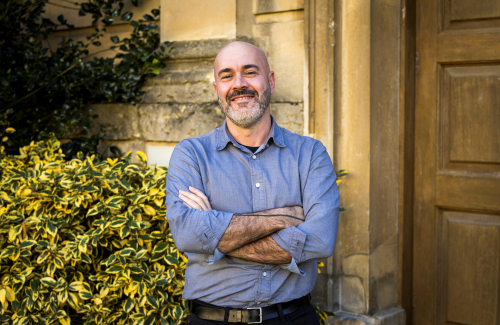
Professor Fredrik Karpe
Fredrik Karpe, PhD, FRCP
Professor of Metabolic Medicine
University of Oxford
Fredrik Karpe is head of the Oxford Centre for Diabetes, Endocrinology and Metabolism. He is a physician-scientist who received initial academic and clinical training at the Karolinska in Sweden. He moved to Oxford in 1999 and became associated with Pembroke in 2004. Over the past two decades he has been using genomics, cell biology and whole body physiology to investigate metabolic consequence of obesity and human fat distribution. As a clinician he is leading the Lipid Clinic Service in OCDEM (Oxford University Hospitals Foundation Trust).
Teaching activities
Coordinating role for Pembroke undergraduate medicine teaching and admissions
Tutorial teaching in BM-1
Supervision of FHS project students
Postgraduate supervision (supervised 14 PhD/DPhil students to completion)
Human fat distribution is a major determinant as to whether adiposity leads to adverse metabolic consequences leading to for example type 2 diabetes or cardiovascular disease. Prof Karpe is particularly interested in the intrinsic features determining regional adipose tissue development and function. Some of factors are known genetic ones, but there might also be a number of epigenetic mechanism. A range of techniques are used to approach this problems. This included adipocyte biology, cell-to-cell communications, use of whole tissue and human in vivo models to understand metabolic function. To understand the human aspects well, Prof Karpe has established a bespoke recall bioresource, the Oxford Biobank (www.oxfordbiobank.org.uk), consisting of 9,000 deeply phenotyped participants who have given informed consent to take part in future studies enabling recall-by-genotype and recall-by-phenotype approaches. Another interesting inroad to linking adult chronic disease to adverse consequences of adiposity is to study ethnic differences and this is done through a range of collaborations (India, Gambia, South Africa, Malaysia). The long-term therapeutic goal is to promote healthy fat storage to reduce adverse consequences of adiposity.
Prof Karpe’s research is funded by the British Heart Foundation, Medical Research Council and the NIHR Oxford Biomedical Research Centre.
- Loh NY, Minchin JEN, Pinnick KE, Verma M, Todorčević M, Denton N, Moustafa JE, Kemp JP, Gregson CL, Evans DM, Neville MJ, Small KS, McCarthy MI, Mahajan A, Rawls JF, Karpe F, Christodoulides C. RSPO3 impacts body fat distribution and regulates adipose cell biology in vitro. Nat Commun. 2020;11:2797
- Hilton C, Neville MJ, Wittemans LBL, Todorcevic M, Pinnick KE, Pulit SL, Luan J, Kulyté A, Dahlman I, Wareham NJ, Lotta LA, Arner P, Lindgren CM, Langenberg C, Karpe F. MicroRNA-196a links human body fat distribution to adipose tissue extracellular matrix composition. EBioMedicine. 2019;44:467-475
- Denton NF, Eghleilib M, Al-Sharifi S, Todorčević M, Neville MJ, Loh N, Drakesmith A, Karpe F, Pinnick KE. Bone morphogenetic protein 2 is a depot-specific regulator of human adipogenesis. Int J Obes (Lond). 2019;43(12):2458-2468
- Neville MJ, Wittemans LBL, Pinnick KE, Todorčević M, Kaksonen R, Pietiläinen KH, Luan J, Scott RA, Wareham NJ, Langenberg C, Karpe F. Regional fat depot masses are influenced by protein-coding gene variants. PLoS One. 2019;14(5):e0217644.
- Denton N, Pinnick KE, Karpe F. Cartilage oligomeric matrix protein is differentially expressed in human subcutaneous adipose tissue and regulates adipogenesis. Mol Metab. 2018;16:172-179.
- Small KS, Todorčević M, Civelek M, El-Sayed Moustafa JS, Wang X, Simon MM, Fernandez-Tajes J, Mahajan A, Horikoshi M, Hugill A, Glastonbury CA, Quaye L, Neville MJ, Sethi S, Yon M, Pan C, Che N, Viñuela A, Tsai PC, Nag A, Buil A, Thorleifsson G, Raghavan A, Ding Q, Morris AP, Bell JT, Thorsteinsdottir U, Stefansson K, Laakso M, Dahlman I, Arner P, Gloyn AL, Musunuru K, Lusis AJ, Cox RD, Karpe F, McCarthy MI. Regulatory variants at KLF14 influence type 2 diabetes risk via a female-specific effect on adipocyte size and body composition. Nat Genet. 2018;50(4):572-580.
- Vasan SK, Osmond C, Canoy D, Christodoulides C, Neville MJ, Di Gravio C, Fall CHD, Karpe F. Comparison of regional fat measurements by dual-energy X-ray absorptiometry and conventional anthropometry and their association with markers of diabetes and cardiovascular disease risk. Int J Obes (Lond). 2018;42(4):850-857
- Karpe F, Vasan SK, Humphreys SM, Miller J, Cheeseman J, Dennis AL, Neville MJ. Cohort Profile: The Oxford Biobank. Int J Epidemiol. 2018;47(1):21-21g.
- Loh NY, Neville MJ, Marinou K, Hardcastle SA, Fielding BA, Duncan EL, McCarthy MI, Tobias JH, Gregson CL, Karpe F, Christodoulides C. LRP5 regulates human body fat distribution by modulating adipose progenitor biology in a dose- and depot-specific fashion. Cell Metab. 2015;21(2):262-273.
- F Karpe, Pinnick KE. Biology of upper-body and lower-body adipose tissue--link to whole-body phenotypes. Nat Rev Endocrinol. 2015;11(2):90-100
News from Medicine
Professor Fredrik Karpe

Fredrik Karpe, PhD, FRCP
Professor of Metabolic Medicine
University of Oxford
Fredrik Karpe is head of the Oxford Centre for Diabetes, Endocrinology and Metabolism. He is a physician-scientist who received initial academic and clinical training at the Karolinska in Sweden. He moved to Oxford in 1999 and became associated with Pembroke in 2004. Over the past two decades he has been using genomics, cell biology and whole body physiology to investigate metabolic consequence of obesity and human fat distribution. As a clinician he is leading the Lipid Clinic Service in OCDEM (Oxford University Hospitals Foundation Trust).
Teaching activities
Coordinating role for Pembroke undergraduate medicine teaching and admissions
Tutorial teaching in BM-1
Supervision of FHS project students
Postgraduate supervision (supervised 14 PhD/DPhil students to completion)
Human fat distribution is a major determinant as to whether adiposity leads to adverse metabolic consequences leading to for example type 2 diabetes or cardiovascular disease. Prof Karpe is particularly interested in the intrinsic features determining regional adipose tissue development and function. Some of factors are known genetic ones, but there might also be a number of epigenetic mechanism. A range of techniques are used to approach this problems. This included adipocyte biology, cell-to-cell communications, use of whole tissue and human in vivo models to understand metabolic function. To understand the human aspects well, Prof Karpe has established a bespoke recall bioresource, the Oxford Biobank (www.oxfordbiobank.org.uk), consisting of 9,000 deeply phenotyped participants who have given informed consent to take part in future studies enabling recall-by-genotype and recall-by-phenotype approaches. Another interesting inroad to linking adult chronic disease to adverse consequences of adiposity is to study ethnic differences and this is done through a range of collaborations (India, Gambia, South Africa, Malaysia). The long-term therapeutic goal is to promote healthy fat storage to reduce adverse consequences of adiposity.
Prof Karpe’s research is funded by the British Heart Foundation, Medical Research Council and the NIHR Oxford Biomedical Research Centre.
- Loh NY, Minchin JEN, Pinnick KE, Verma M, Todorčević M, Denton N, Moustafa JE, Kemp JP, Gregson CL, Evans DM, Neville MJ, Small KS, McCarthy MI, Mahajan A, Rawls JF, Karpe F, Christodoulides C. RSPO3 impacts body fat distribution and regulates adipose cell biology in vitro. Nat Commun. 2020;11:2797
- Hilton C, Neville MJ, Wittemans LBL, Todorcevic M, Pinnick KE, Pulit SL, Luan J, Kulyté A, Dahlman I, Wareham NJ, Lotta LA, Arner P, Lindgren CM, Langenberg C, Karpe F. MicroRNA-196a links human body fat distribution to adipose tissue extracellular matrix composition. EBioMedicine. 2019;44:467-475
- Denton NF, Eghleilib M, Al-Sharifi S, Todorčević M, Neville MJ, Loh N, Drakesmith A, Karpe F, Pinnick KE. Bone morphogenetic protein 2 is a depot-specific regulator of human adipogenesis. Int J Obes (Lond). 2019;43(12):2458-2468
- Neville MJ, Wittemans LBL, Pinnick KE, Todorčević M, Kaksonen R, Pietiläinen KH, Luan J, Scott RA, Wareham NJ, Langenberg C, Karpe F. Regional fat depot masses are influenced by protein-coding gene variants. PLoS One. 2019;14(5):e0217644.
- Denton N, Pinnick KE, Karpe F. Cartilage oligomeric matrix protein is differentially expressed in human subcutaneous adipose tissue and regulates adipogenesis. Mol Metab. 2018;16:172-179.
- Small KS, Todorčević M, Civelek M, El-Sayed Moustafa JS, Wang X, Simon MM, Fernandez-Tajes J, Mahajan A, Horikoshi M, Hugill A, Glastonbury CA, Quaye L, Neville MJ, Sethi S, Yon M, Pan C, Che N, Viñuela A, Tsai PC, Nag A, Buil A, Thorleifsson G, Raghavan A, Ding Q, Morris AP, Bell JT, Thorsteinsdottir U, Stefansson K, Laakso M, Dahlman I, Arner P, Gloyn AL, Musunuru K, Lusis AJ, Cox RD, Karpe F, McCarthy MI. Regulatory variants at KLF14 influence type 2 diabetes risk via a female-specific effect on adipocyte size and body composition. Nat Genet. 2018;50(4):572-580.
- Vasan SK, Osmond C, Canoy D, Christodoulides C, Neville MJ, Di Gravio C, Fall CHD, Karpe F. Comparison of regional fat measurements by dual-energy X-ray absorptiometry and conventional anthropometry and their association with markers of diabetes and cardiovascular disease risk. Int J Obes (Lond). 2018;42(4):850-857
- Karpe F, Vasan SK, Humphreys SM, Miller J, Cheeseman J, Dennis AL, Neville MJ. Cohort Profile: The Oxford Biobank. Int J Epidemiol. 2018;47(1):21-21g.
- Loh NY, Neville MJ, Marinou K, Hardcastle SA, Fielding BA, Duncan EL, McCarthy MI, Tobias JH, Gregson CL, Karpe F, Christodoulides C. LRP5 regulates human body fat distribution by modulating adipose progenitor biology in a dose- and depot-specific fashion. Cell Metab. 2015;21(2):262-273.
- F Karpe, Pinnick KE. Biology of upper-body and lower-body adipose tissue--link to whole-body phenotypes. Nat Rev Endocrinol. 2015;11(2):90-100

